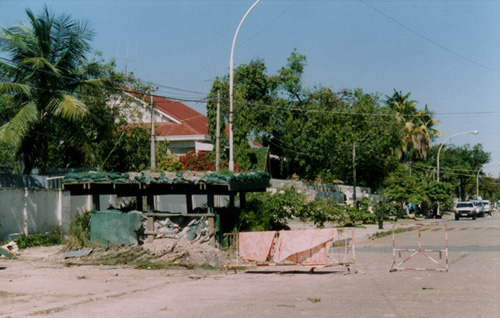14 |

PHOTO: RICH GARELLA
Shattered: A blockhouse that had been protectingPrince Ranariddh’s residence on Street 214
IT WAS A CURIOUS COUP, staged by one prime minister against another in the same government.
Hun Sen was in a good position to control the electoral process the following year, but the election would be worthless to him unless the international community approved it. Through an agreement engineered by Japan, Hun Sen agreed to let Funcinpec and Rainsy’s party run, and to guarantee the safety of their top leaders. It was open season on everyone else.
Rainsy’s supporters in particular were assaulted and killed by the score as election day approached. Television and radio stations blared speeches by Hun Sen and his supporters to the exclusion of almost all other news.[n] [s]
The National Assembly, newly stocked with Hun Sen supporters,[n] appointed a cooperative election commission that changed the rules as needed. Electoral “experts,” many supplied by Canada and the European Union, helped the commission make the changes it wanted. Since they were only advisers, they made no judgments on the merits of these changes.
Two days before the election the bulk of the foreign poll watchers took their positions, along with the international journalists. As soon as the eyes of the world’s mobile democracy team focused, however briefly, on Cambodia, the killings ceased.
“Hun Sen can turn off the faucet,” a U.N. human rights worker in Cambodia noted, “and he can turn it back on.”
Before the votes were counted, before the observers’ reports were in from the field, and before any of the hundreds of complaints filed by the opposition were even considered, the Joint International Observer Group (the ad hoc group representing most of the foreign observers) announced that the polling and counting were “free and fair to an extent that enables it to reflect, in a credible way, the will of the Cambodian people”[n] and soon thereafter, vacated.
Stephen Solarz, a former congressman from New York, parachuted in on behalf of the National Democratic Institute,[n] the counterpart of Ron Abney’s IRI, and coined the phrase “miracle on the Mekong.” This news bite instantly dominated the coverage—and infuriated his own group’s election observers.[n]
Inspired in part by the demonstrations that had only recently toppled Suharto in Indonesia, tens of thousands of Funcinpec and Rainsy supporters marched in the streets demanding an investigation of voting irregularities.
Hun Sen’s reply came on September 7, when a long line of trucks pulled into the national stadium and unloaded bundles of wooden staves and thousands of hired thugs. The next morning marked the beginning of a week of terror.[n]
Led by police in plain clothes, the mob chased protesters off the streets, beating those they caught, even Buddhist monks, and shooting some on the spot. The government forbade newly elected opposition members from leaving the country unless they implicitly accepted the election results by taking their seats in the assembly. Bodies started turning up again, some in shallow graves, others floating in the Mekong.
In Washington, State Department spokesman James Rubin condemned the violence in language that was, as always, careful not to point the finger. “It is time for the Cambodian political crisis to be resolved in a nonviolent manner through dialogue,” he said. “We urge the parties to conduct their activities in accordance with those principles.”
After two months, Prince Ranariddh caved, and accepted the election results. The prince was named president of the National Assembly, while valuable government positions were handed out to Funcinpec's ranking members. Beautiful new houses soon arose in the Prince's personal compound in Kien Svay, southeast of Phnom Penh.
Funcinpec would resume its role in a coalition government, but this time its submissive position was official. As diplomats in attendance pumped each other’s hands, the assembly members were sworn in at a splendid ceremony at the gates of ancient Angkor Temple.[n] Hun Sen had won again.
The very next day, eighteen months after its agents had left Cambodia, the FBI delivered an unclassified version of its report to the Senate Foreign Affairs committee. Unsigned and undated, the report was more a report on the process of the investigation than a report on the massacre and who might have ordered it.
The conclusions previously reported by The Washington Post were absent, and the evidence that pointed in the direction of Hun Sen was barely noted. “All investigative findings are complete, the report concluded. “The FBI has presented its investigative findings to the Department of Justice for a prosecutive opinion.”[n]
